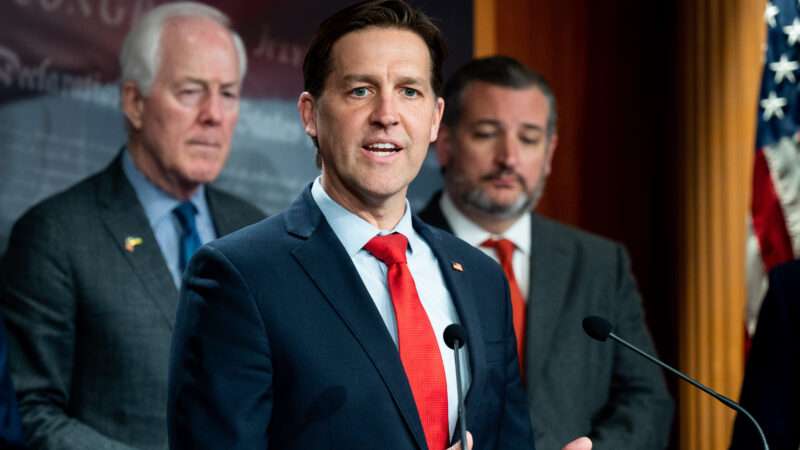
Few Republican critics of Donald Trump lasted as long in Congress as Sen. Ben Sasse (R–Neb.). Today his run, like those of so many before him, comes to an end.
Sasse, a Yale-trained historian and onetime president of a small Lutheran college, exits the Senate two years after winning reelection to a second term to assume the top post at the University of Florida.
During his eight years in Washington (not including previous stints in the executive branch), Sasse was often a voice of civility and moderation but also of hard truth telling. In 2016, he was one of the first to say he would vote for a third party rather than support then-candidate Donald Trump. Later, he excoriated the 45th president on a range of charges, saying on one occasion that he objects to "the way [Trump] treats women, spends like a drunken sailor," and more. "He mocks evangelicals behind closed doors. His family has treated the presidency like a business opportunity. He's flirted with white supremacists," Sasse went on.
After a pro-Trump mob invaded the Capitol in 2021 in a half-baked attempt to stop certification of Joe Biden's election, Sasse was among the handful of Republicans who voted to convict the outgoing president. He was similarly one of the small number who voted to create a commission to investigate January 6.
Availing himself of the chance to offer farewell remarks from the Senate floor on Tuesday, Sasse twice lamented the "I alone can fix it" mentality that has arisen on the political right, a barely veiled reference to the former president.
His 30-minute speech, and a companion op-ed published in The Wall Street Journal a day earlier, contrasted two groups that Sasse believes represent America's "true divide": civic pluralists (who "value debate and persuasion" and are "committed to human dignity, even for those with whom we disagree") and political zealots (who "seek total victory in the public square"). Whether they're on the left or on the right, he said Tuesday, "the message of all politics-first folks is basically the same: The only way to put an end to the culture war is to move beyond the outdated idea of a limited Constitution and instead grab more power for the 'good guys' while there's still time. The left's plan is more unelected, unaccountable bureaucrats. The right's plan is now to give similar kinds of power to a strongman. But ultimately, there's not much difference between these so-called plans."
Close readers of Reason may notice a likeness to ideas I've articulated in these pages. "The factions differ on who should be Caesar," Sasse said, "but beyond that, there's much on which they agree. They salivate on the idea of chaos and our disrupted age that can be the excuse for seizing more power. They foment anger and fear because they think if we're angry and scared enough, we'll assent to some Caesarist solution." Or as I put it in the October 2022 issue of the magazine, "Partisan animosity suits the authoritarian elements on the left and right just fine. Their goal is power, and they have little patience for procedural niceties that interfere with its exercise. As history teaches, a base whipped up into fear and fury is ready to accept almost anything to ensure its own survival."
Dark as all that sounds, Sasse's conclusion is surprisingly optimistic: "These factions are dangerous, to be sure," he said Tuesday, "but here's what we fail to appreciate most of the time: They're factions, and they're small, and they command nothing like majority opinion."
He went on to argue that when one side wins an election, it's because voters are "temporarily more disgusted by the other side's arrogant overreach," not because they're giving someone a "sweeping mandate" to impose his or her vision on the country. The zealots may be louder, he was suggesting, but most Americans are pluralists at the end of the day. "They don't want a left-wing nanny state telling them how to live," he said, "and they certainly don't want a right-wing potentate promising to crush all of our so-called 'domestic enemies.'"
None of this is to suggest that Sasse is a model libertarian. His positions on immigration and criminal justice issues in particular offer plenty to offend. But one of Sasse's claims is that there are more important things than disagreement over public policy—like shared commitment to our pluralist founding principles.
"Yes, policy matters, and yes, there must be important and vigorous debate," he said in his speech. "And no, being polite for the sake of being inoffensive isn't the highest good, and no, mushy middle kumbaya-ism will not be a strategy. But more than debates about policy, we need Americans to believe they can build again. We need to believe that loving your neighbor is more important than the policy disagreements."
If Sasse is right, there's far more civic pluralism extant in America than cable news and social media might lead you to think. Alas, after today, there's a little less of it in Washington.
The post Goodbye, Ben Sasse appeared first on Reason.com.







